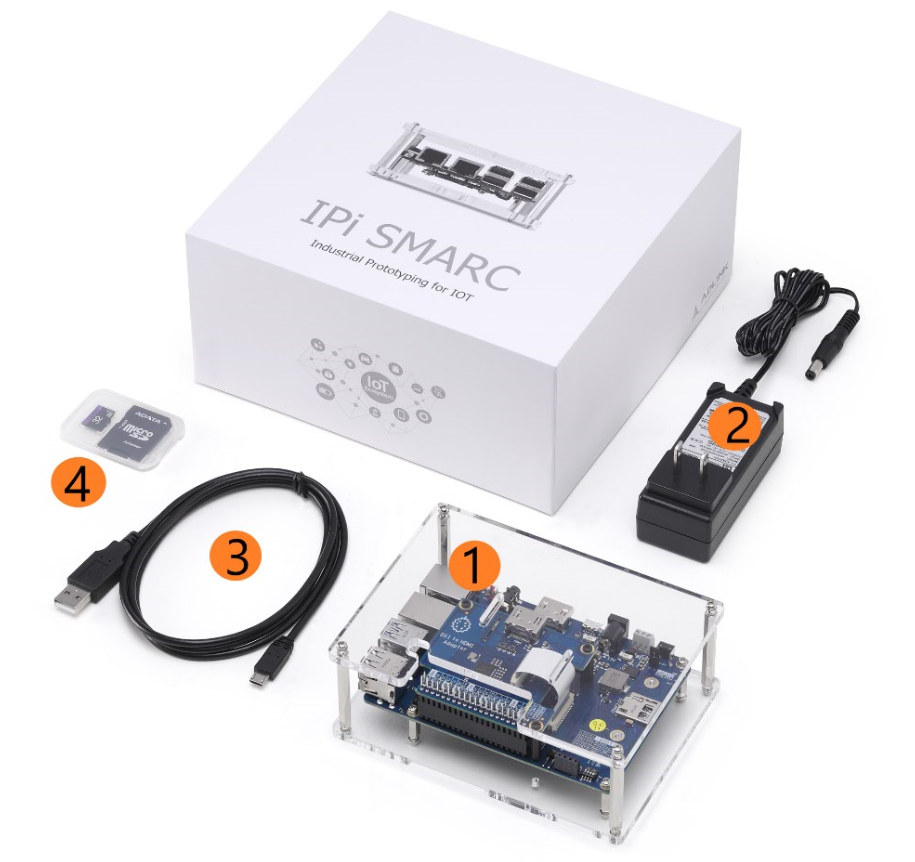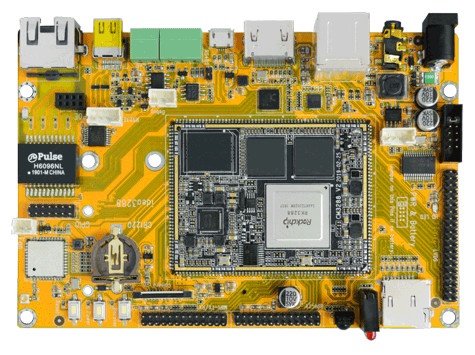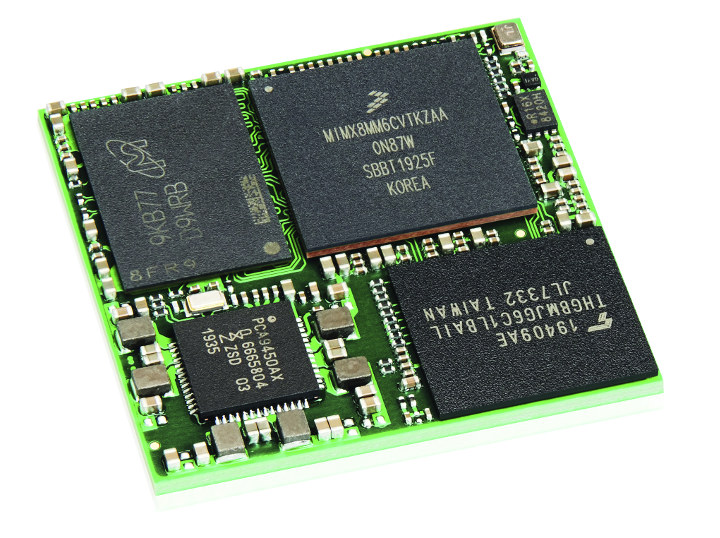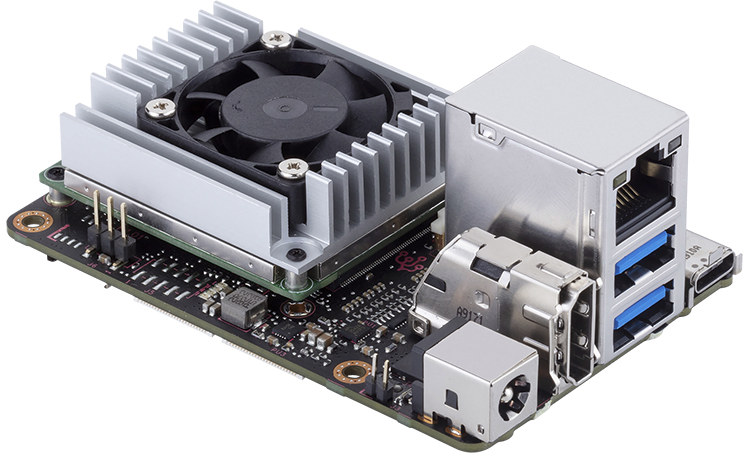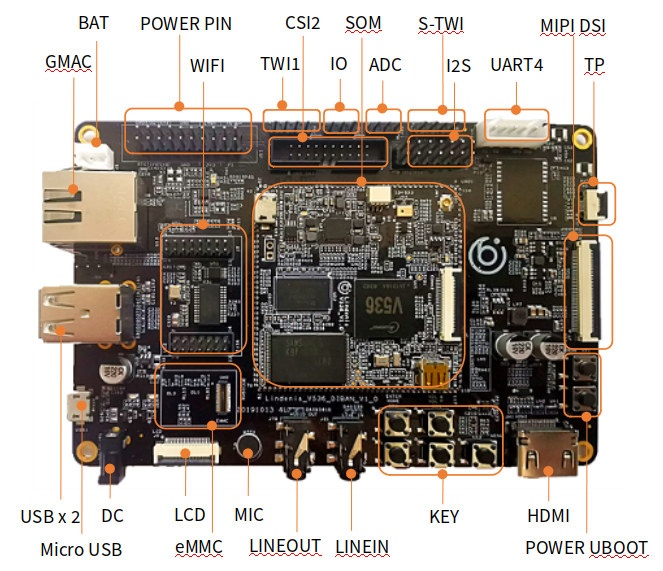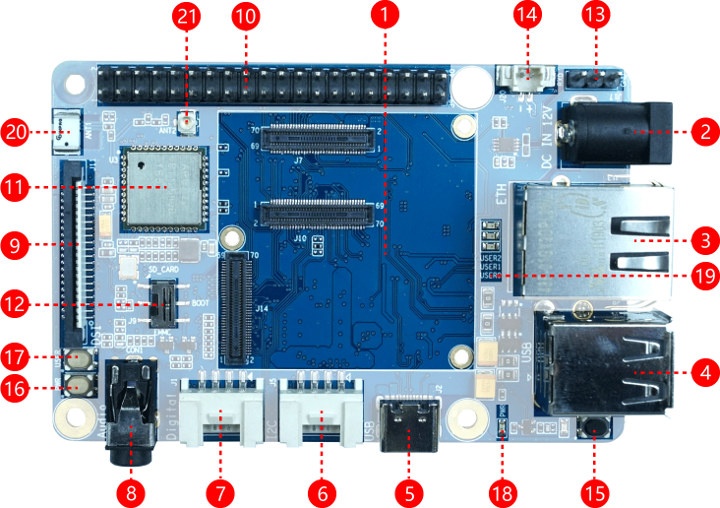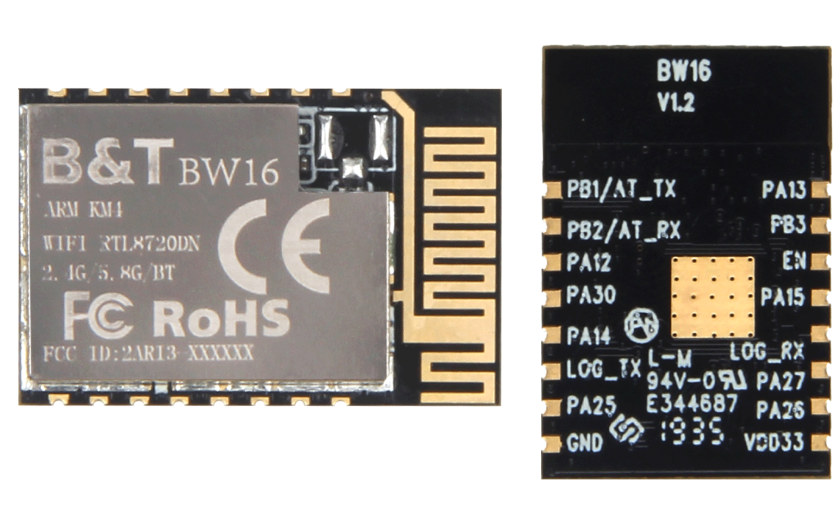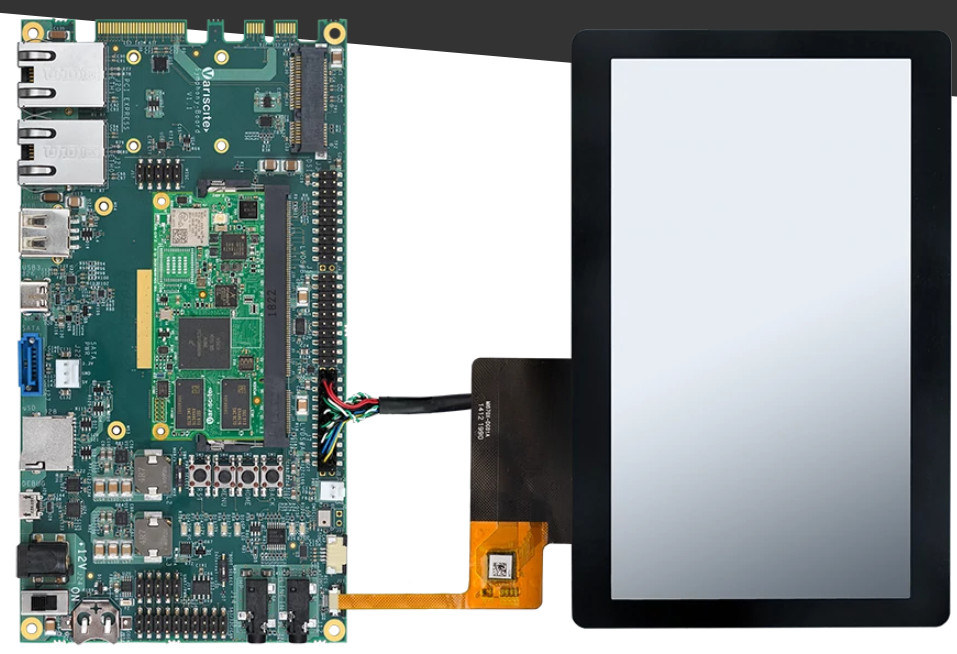ADLINK Technology has just announced the Industrial-Pi (I-Pi) SMARC Development Kit to help engineers quickly design prototypes for industrial applications using peripherals and sensors. The I-Pi SMARC development kit is comprised of a baseboard, LEC-PX30 SMARC-compliant Rockchip PX30 system-on-module, an acrylic case, a 12V/2A power supply, USB cable, and a 32GB MicroSD card. The company promotes the kit as “an industrial-ready substitute for Arduino and Raspberry Pi (RPi) platforms that are commonly used for prototyping but cannot typically be ‘dropped’ into an industrial solution as-is“. LEC-PX30 SMARC System-on-Module Specifications: SoC – Rockchip PX30 Quad-core Arm Cortex-A35 CPU with TrustZone technology, ARMv8 Cryptography Extensions, Mali-G31 GPU System Memory – 1GB or 2GB DDR3L at 1066/1333 MHz Storage – 8, 16, 32 or 64 GB eMMC flash Connectivity – 10/100M Ethernet from SoC, 10/100M Ethernet via LAN9514 USB 2.0 Ethernet controller Video Decoding – H.264 up to 1080p60, H.265/HEVC up to 1080p60, […]
Boardcon Idea3288 Android SBC is Made for Digital Signage, Smart PoS, and Vending Machines
Boardcon Announces the Idea3288 SBC Boardcon Idea3288 targets the commercial market with a variety of applications for its latest SBC, utilizing a Rockchip 3288 CPU module. The company says the Idea3288 is customizable for whatever commercial application that can be had, such as digital displays, vending machines, intelligent POS, automotive, IoT, and even access control systems. Idea SoC RK3288 and Interfaces The SBC is comprised of a Rockchip RK3288 quad-core Arm Cortex A17 processor with a Mali-T764 GPU, 2GB RAM, and 8GB eMMC flash. The interfaces include GbE, mDP, HDMI, 3x USB2.0 Host ports, one USB OTG port, audio, battery, MIPI DSI/CSI, UARTs, RS485, CAN, POE, Micro SD, PCI-e (for 4G modem), M.2 slot (for SSD), SIM slot, and more. The SBC is made up of a carrier board and a CPU module The SBC runs Android 7.1.2 operating system and is built to handle 4K video playback. The Idea3288 […]
Kontron Launches the Smallest i.MX 8M Mini Module with 30x30mm Form Factor
Introduced in 2018, NXP i.MX 8M Mini is the first i.MX processor from the company manufactured with a 14nm process, and the low-power processor is found in several compact modules such as Variscite VAR-SOM-MX8M-MINI (38×28 mm), SolidRun i.MX 8M Mini SoM (47×30 mm), or Compulab UCM-iMX8M-Mini (38×28 mm). The smallest i.MX 8M Mini module we’ve covered so far is TechNexion XORE-IMX8M-Mini LGA system-on-module that takes just 30×30 mm of space. The TechNexion module is now joined by Kontron SoM SL i.MX8M Mini module with the same 30x30mm form factor, but a few more pins (267 vs 225). Kontron SoM SL i.MX8M Mini specifications: SoC – NXP i.MX 8M Mini quad-core Arm Cortex-A53 processor @ 1.6 GHz with one Arm Cortex-M4 real-time core @ 400 MHz, as well as 2D GPU and 3D GPU System Memory – 1GB LPDDR4 RAM (option up to 4GB) Storage – 8GB eMMC flash (option up […]
ASUS Tinker Edge T SBC Launched for $168 and Up
ASUS unveiled Tinker Edge T & CR1S-CM-A SBCs based on Google Coral Edge TPU system-on-module featuring both NXP i.MX 8M processor and Google Edge TPU co-processor for AI acceleration in May 2019, but at the time none of the boards were available. But earlier this month, ASUS officially announced the board, and it can now be purchased on various sites including Provantage (~$168.35) and Physical Computing (21,600 JPY ~ $200). It is also listed on Connection for about $198 but currently out of stock. Edge TPU module SoC – NXP i.MX 8M quad-core Arm Cortex-A53 processor with Arm Cortex-M4F real-time core, GC7000 Lite 3D GPU ML accelerator – Google Edge TPU coprocessor delivering up to 4 TOPS System Memory – 1 GB LPDDR4 RAM Storage – 8 GB eMMC Flash memory Wireless Connectivity – Wi-Fi 2×2 MIMO (802.11b/g/n/ac 2.4/5GHz) Bluetooth 4.2 Baseboard Storage – MicroSD card slot Networking – Gigabit […]
Lindenis V536 SoM & SBC Targets 4K Camera Applications
Back in summer 2018, we wrote about Lindenis V5 single board computer based on Allwinner V5 quad-core Cortex-A7 processor with two MIPI CSI connectors and designed for 4K cameras. Allwinner has now come up with a new 4K camera processor very similar to V5, since Allwinner V566 comes with two Cortex-A7 cores, and a single MIPI CSI interface, and Lindenis designed a new SBC based on the new processor using a SoM + baseboard design instead. Lindenis V536 specifications: SoM SoC – Allwinner V536 dual-core Cortex-A7 processor @ 1.2 GHz; 4K H.265/H.264 video encoding & decoding @ 30 fps; 28nm process System Memory – 1GB DDR3 Storage – SPI NOR flash or SPI NAND flash, bootable MicroSD card Video Output – Micro HDMI 1.4 port Video Input – MIPI CSI connector Audio – Digital microphone Connectivity – 802.11b/g/n/ac Wi-Fi 5 & Bluetooth 4.2 via AP6255 Baseboard Interface – Castellated holes […]
ODYSSEY-STM32MP157C SBC Feature STMicro STM32MP157C Cortex-A7/M4 SoC
Seeed Studio has been working on a single board computer powered by STMicro STM32MP157C Arm Cortex-A7/M4 microprocessor, comprised of the Raspberry Pi inspired NPi-STM32MP157C baseboard, and SoM-STM32MP157C system-on-module. SoM-STM32MP157C SoM Module specifications: MPU (1) – STMicro STM32MP157C dual-core Arm Cortex-A7 processor @ 650 MHz, and Arm Cortex-M4F MCU System Memory (2) – 512MB DDR3 RAM Storage (4) – 4GB eMMC flash Host Connectors – 3x 70-pin board-to-board connectors with HDMI, USB, Gigabit Ethernet, audio GPIOs, etc… Misc – Power and USER LEDs PMU (3) – STPMIC1A power management IC Dimensions – 38mm x 38mm The module is said to targets consumer and industrial applications, white goods, medical equipment, and wearable devices. NPi-STM32MP157C baseboard Key features and specifications: SoM Support – Compatible with SOM-STM32MP157C described above Storage – MicroSD card slot Display I/F – 1x MIPI DSI interface Audio – 3.5mm audio jack, WM8960 audio codec Camera I/F – 1x […]
Realtek RTL8720DN Dual-Band WiFi & Bluetooth 5.0 IoT Modules Sell for $4 and Up
There are plenty of 2.4 GHz WiFi modules for IoT project based on processors ranging from Espressif Systems ESP8266 to TI CC3200, or Realtek RTL8710. Some others add Bluetooth 4.2/5.0 such as Espressif Systems ESP32, but it’s much harder to find solutions with dual-band WiFi especially if you have a tight budget for your project or product. But Realtek RTL8720DN – part of AmebaD family – offers just that with the Arm Cortex-M4/M0 wireless MCU supporting dual-band (2.4/5.0GHz) 802.11 b/g/n WiFi and Bluetooth 5.0 connectivity, and found in modules currently selling for as low as $3.90 or 24 RMB in single units. B&T BW16 RTL8720DN Module Specifications: Wireless SoC – Realtek RTL8720DN MCU with KM4 Arm Cortex-M4 core @ 200 MHz and KM0 Arm Cortex-M0 core @ 20 MHz Connectivity WiFi 802.11 a/b/g/n WiFi 4 Frequency Range – 2.412-2.484GHz & 5.180-5.825GHz Data Rates 802.11a: 6,9,12,18,24,36,48,54Mbps 802.11b: 1,2,5.5,11Mbps 802.11g: 6,9,12,18,24,36,48,54Mbps 802.11n: […]
Variscite Introduces i.MX 8M Mini and Nano SoM’s, Symphony Carrier Board
NXP i.MX 8M Mini and i.MX 8M Nano are lower cost and lower power variants of NXP i.M 8M processors manufactured using a 14nm FinFET process, and cutting some features such as HDMI and embedded DisplayPort, or hardware video decoder. NXP i.MX 8M Mini has been announced for over two years, so we’ve already written about many boards and systems-on-module (SoM) including Boardcon EM-IMX8M-MINI SBC, TechNexion XORE LGA SoM, or Congatec conga-SMX8-Mini SMARC 2.0 module among others. NXP i.MX 8M Nano is more recent, and we only covered a few announcements so far namely iWave Systems iW-RainboW-G34M-SM SoM and Conga-SMX8-Nano SMARC 2.0 computer-on-module. There’s now at least a third company working on a “Nano” module with Variscite announcing VAR-SOM-MX8M-NANO SoM together with a “Mini” version called VAR-SOM-MX8M-MINI, and Symphony carrier board and development kits. VAR-SOM-MX8M-MINI & VAR-SOM-MX8M-NANO Modules Both modules are part of Variscite VAR-SOM Pin2Pin family, and share the […]


